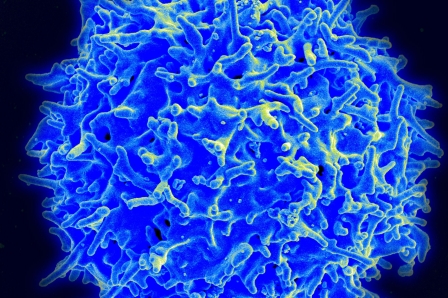After Three Deaths, FDA Halts Juno’s Leading CAR-T Trial

The FDA has halted a clinical trial of a closely-watched cell-based cancer immunotherapy from Seattle’s Juno Therapeutics after two patients died last week during the trial. Those deaths followed a death in May, Juno officials said today.
Juno says all three patients died of cerebral edema, or swelling in the brain, and it thinks it knows why. The company has asked the FDA to allow the mid-stage trial to continue with modifications.
The Phase 2 trial is studying JCAR015 in adults who have acute lymphoblastic leukemia, specifically patients who have relapsed or whose cancer has resisted treatment. JCAR015 is type of therapy known as CAR-T, which uses a patient’s own T cells that are modified outside the body, then reintroduced to be better cancer killers.
Until the hold, Juno had hoped to present the study’s data to the FDA and receive a marketing approval decision in 2017. Those plans are likely to be delayed, CEO Hans Bishop said on a conference call this afternoon.
The deaths came after clinicians added a chemotherapy called fludarabine to what is called the preconditioning regimen of the trial. Preconditioning is the medical term for treating the patients with potent chemotherapies, such as fludarabine, before unleashing the CAR-T therapy, which uses modified T cells to attack cancer.
Juno (NASDAQ: JUNO) has asked the FDA to allow it to proceed without fludarabine, instead only providing cyclophosphamide, another chemotherapy used in the trial, to patients for the preconditioning. Before allowing the company to do so, the FDA asked that Juno submit a raft of revised materials, including patient consent forms, investigator brochures, and the trial protocol.
Juno says it will do so this week.
It was not immediately clear where the patients who died were being treated. Juno has enrolled 20 of a planned 90 patients in the trial, dubbed ROCKET. Twelve cancer centers are listed as test sites on the trial’s Clinicaltrials.gov page.
The FDA’s hold does not apply to Juno’s other CAR-T products, the company said, including JCAR017, which is in a Phase 1 trial for patients with B cell non-Hodgkin lymphoma.
Juno’s decision to “precondition” all its CAR-T recipients—not just those getting JCAR015—with fludarabine and cyclophosphamide came last year, after Juno collaborator Cameron Turtle of the Fred Hutchinson Cancer Research Center in Seattle showed that patients fared better when receiving the combination before another T cell therapy, JCAR014. Juno CFO Steve Harr told Xconomy the combination would become part of the regimen “broadly across our portfolio, at least in [hematological] malignancies.”
“I do not want to minimize the chemo, but it is generally a single course and well tolerated,” Harr said. “It is something that we want to work to eliminate over time, but [we] do not see it limiting us, at least in the patients we are treating today.”
Juno has been racing against other CAR-T therapy developers for years, raising more than $ 300 million in venture funding as a private company before it took its work to the public markets. The company raised almost $ 265 million in its December 2014 initial public stock offering. The stock jumped to $ 35 a share in its first day of trading, and it has, for the most part, remained above that since—until now.
After announcing the news of the two deaths this afternoon, Juno shares plummeted 28 percent in after-hours trading to $ 29.50 per share as of 8pm Eastern time.
(25)


